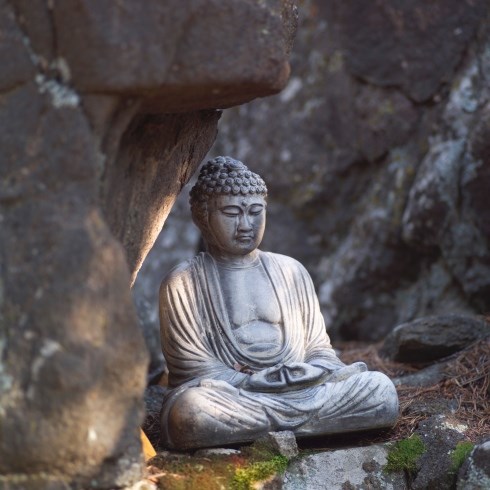
What causes terrorism? Failure to understand the causes dooms us to inadequate or even ruinous responses. Is it really as simple as many, such as former president G. W. Bush, say it is, namely “they hate us for our freedom,” or it’s “good (us) versus evil (them).”? President Bush may well be correctly identifying religion as having a causative relationship with the problem of terrorism, but the limited, triumphal moral sensibility which he exemplifies is not up to the task of guiding us to a solution.
So I wonder, what if an American leader were a fundamentalist Buddhist instead of a born-again Christian? How might such a leader approach the problem of terrorism from the “Pratīityasamutpāda” point of view?Pratīityasamutpāda is the Buddhist vocabulary of causation. It is a phrase meaning “co-dependent arising” or “interdependent co-arising” and represents how Buddhist thinkers, not having recourse to a Creator God, discuss the limit or patterns of the chain of cause and effect.
Within this milieu, a “poison” is the religious equivalent of “sin.” Unlike a 'sin', a poison is not a violation of an external code of behaviour; it is an activity that interacts with everything else (dharmas) in ways that are unwholesome and harmful. The antidote to the poisons is ahimsa (Skt. No harm)
. Delusion, like hatred and greed, is called a poison because it is invariably harmful, often supporting an arrogant and bullying relationship. In Buddhist thought delusion and ignorance are a little bit different. Ignorance is what you don’t know, while delusion means what you do know that just is not so. But experientially these different things are invariably concomitant and in practice synonymous. This understanding of cause and effect is applicable both to individual and collective entities because these are not independent things. Indeed, in a conceptual universe governed by interdependent co-arising there could be no ultimately independent entities. How would a Buddhist moral sense differ from our normative morality and in what way would understanding this help us deal with international terrorism?
A “Good vs. Evil” sort of dualism sounds plausible within a context which has long accepted as axiomatic that “we” are hated, feared and oppressed because of our proximity to the true God. This analytical mode finds purchase within both Christianity and Islam; both tolerate a certain militancy with respect to devotion married to a deep belief that real destiny lies completely beyond time itself. Both valorize martyrdom and holy war. Both espouse a morality that justifies inflicting harm and nurturing a harmful intent as long as “we” are in the right. Each of our religious histories is replete with examples. To say this in another way, morality within the Abrahamic religions is tethered somehow to a notion that, ultimately, “It is better to be right than to be kind.” It is fundamental that what is at stake in these traditions is eternity, an unchanging heaven or hell. The gate to heaven opens in response to certainty and righteousness. Doubt and sinfulness open the gate of hell: simple, straightforward and devastating. The morality that flows from such a notion is distinguished as a “meticulous” morality because it has at its base such a high component of fearfulness (from metus = Latin for fear). We fear fear, as an earlier American president observed.
A Buddhist analysis of the appropriate historical response to terrorism would include taking an unsentimental look at the actual situation and our part in its fruition. Buddhism is above all something that one does: it is a path, a way. It is called the Middle Way, which is defined initially as avoiding “falling into extremes.” The middle way requires suspending extreme judgements such as “good” and “evil,” which is almost impossible to do but is nevertheless necessary. In meditation one learns how to do this. Such moments of equipoise can bring a constructive influence to competitive living. These moments of equipoise are as regenerative as the poisons are harmful. The middle way is to construct an inclusive way of thinking about and reacting to the exigencies of life and living. The middle way uses meditation to intentionally bring composure into our everyday mind.
Our challenge is to find a response to terrorism that meets the near-term needs of security and defense without completely eliminating any possibility of a long-term solution (other than annihilation). Buddhist meditation might well be a tremendous asset in attempting to walk this razor edge. Buddhism has good credentials in this regrd because at least some of the teaching traditions have emphasized the importance of the relationship between extremes of dualistic thought rather than the absorption of the extremes into “one” or the choosing of one extreme over the other. Zen especially emphasizes the “not one, not many” vocabulary.
Morality is an environmental necessity and a determinative influence on human society. Do the fundamentalists (Islamic and Christian) who hate and fear us have a point? Has our moral habitativeness been degraded? There is some reason to be concerned. Thinking back about Martin Luther King Jr., Gandhi, Malcolm X, perhaps even John and Robert Kennedy, we can see a higher quality of leaders that we used to produce and recognize. In a few short months in the early 60's virtually every major leader who embodied something worthy of emulation was assassinated. It is said that if you cut off the head, the body will die.
This terrorism from without is a major test of our basic civilization. If we are to survive this terrorist scourge we need to find a voice that can impel a cohesion equivalent to that experienced amongst those who have responded to a call; a voice that can renew a feeling of being a part of, or an heir to, something worthy. Such a voice will have to come from other than the current religious, social, intellectual or politically empowered elites. The voice of our religious traditions can scarcely be heard over the clamor raised by widespread abuse scandals. The voice of our political traditions is less and less concerned with or able to exert authority without coercion and division. The exemplars of capitalism steal everything in sight the moment government regulations are weakened. That is why the spiritual response to the terrorist challenge must be renewal, and we must resist the impulse to indulge in moral judgment. The whole clamor to claim the “right” is the problem, not the solution. The spiritual value of renewal eschews any notion of a non-inclusive human destiny.
There is little public sense today that our leaders ever stray far from a cynical self-interest. Our leaders, our defining classes, are seen as the shallow end of the human pool who mostly run away from any hint of responsibility and are morbidly risk aversive. By and large, they lack the credibility to suggest that the status quo involves anything worth dying for.
Yet our young die anyways. Many of our children prefer an ignoble and anonymous suicide to the future offered them. It is claimed that suicide is the third leading cause of death for young people in the West. Now consider how much more attractive would suicide be in Islamic communities where despair can be redeemed by a meaningful and admired death? There is no prevailing in a race to the highest suicide rate.
It is natural for a frog, tossed into hot water, to panic in its struggle to get out; just as it is in the nature of a frog to allow a slow heating of its environment even unto death. Individually and collectively we behave rather like the frog, but with this issue of worldwide and unrelenting terrorism, long-term survival requires a far more measured and scrupulous reaction. It has to be obvious that there can be no winner in the usual, triumphal sense of that word. Even if a military solution were possible, the victory would destroy the victors as well. As long as most of us think that rightness will triumph, there is very little hope that this new era of terrorism will be over soon. But, if we take the “kill ‘em all and let God sort it out” approach, which some have already suggested, then we will have entered an immoral world which cannot sustain human life.
We undertake this test as an increasingly factionalized society; the factions set to squabbling over crumbs like seagulls on a tourist beach. But we can, if we want to, find a voice that speaks from our better natures. That collective voice starts with each individual and can best be found in the stillness of Buddhist meditation. The theory is that, since “our” better natures are the same as “their” better natures, we need only act from our better natures to give ourselves a chance for survival.
 Wayne Codling is a former Zen monastic and a lineage holder in the Soto Zen tradition as taught by the Japanese Zen master, Shunryu Suzuki-roshi (Zen Mind, Beginner’s Mind). He teaches Zen style meditation in various venues around Victoria, including regular, drop-in, no charge sessions each Sunday at the Vic West Community Centre and regular classes with young offenders at a correction centre. Wayne’s talks and some writings can be found on his blog (http://sotozenvictoria.wordpress.com), and practice questions are responded to at: http://zendog.ca.
Wayne Codling is a former Zen monastic and a lineage holder in the Soto Zen tradition as taught by the Japanese Zen master, Shunryu Suzuki-roshi (Zen Mind, Beginner’s Mind). He teaches Zen style meditation in various venues around Victoria, including regular, drop-in, no charge sessions each Sunday at the Vic West Community Centre and regular classes with young offenders at a correction centre. Wayne’s talks and some writings can be found on his blog (http://sotozenvictoria.wordpress.com), and practice questions are responded to at: http://zendog.ca.
You can read more articles from our interfaith blog, Spiritually Speaking, HERE


